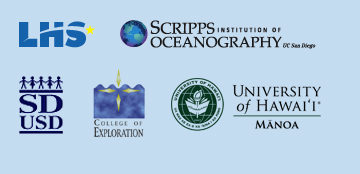The Communicating Ocean Sciences courses extend their reach into the Central Pacific region through a collaboration with University of Hawai'i at Manoa and Maui College in the Pacific Ocean Literacy for Youth, Publics, Professionals and Scientists (POLYPPS) project. This partnership is supported by the National Science Foundation Geosciences Directorate Ocean Sciences Division for a “New Collaboration with an Existing Center for Ocean Sciences Education Excellence” ($150,000, 2008-2011).
Communicating Ocean Sciences-Traditional Knowledge
Due to the importance of place-based education in Hawaii, POLYPPS is working to contextualize the Communicating Ocean Sciences courses with local and traditional exemplars and knowledge systems. POLYPPS has engaged a dynamic and respected group of traditional practitioners to advise efforts for respectfully and responsibly integrating aspects of traditional ecological knowledge with the course material. These components will be introduced gradually into the Communicating Ocean Sciences curriculum with the hope of providing a process model for other institutions interested in similar efforts.
The Communicating Ocean Sciences courses are taught at the graduate level at the University of Hawaii at Manoa (UHM) and at the undergraduate level at the University of Hawaii – Maui College.
- The graduate-level course targets students interested in improving both their teaching skills and their ability to communicate about complex science concepts, especially culturally relevant ocean sciences education. **The course developed through a curricular framework that links local and indigenous concepts of environmental stewardship with ocean literacy principles.
- The instructors introduced students with graduate standing in science to teaching science using inquiry-based pedagogy with grade-level appropriate instructional materials that were developed and tested by the Lawrence Hall of Science.
- An important component of the course, but not the main focus, was communicating science informally to a general audience.
- Together with formal or informal educator-partners, students developed an activity or presentation that incorporated place- or culture-based practices, included the essential parts of the learning cycle, and addressed multiple learning styles.
- The undergraduate-level course combined instruction on effective ways of communicating scientific knowledge with direct experiences in K-12 classrooms and informal education sites, such as aquariums and marine-related tourist operations.
- Instructors emphasized and demonstrated inquiry-based teaching methods and learning pedagogy.
- Together with formal or informal educator-partners, students were required to develop an activity or presentation that included the essential parts of the learning cycle, accommodated multiple intelligences, and was inclusive of all learning styles.
|


